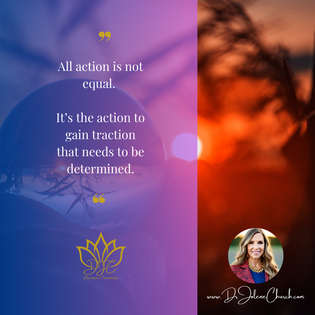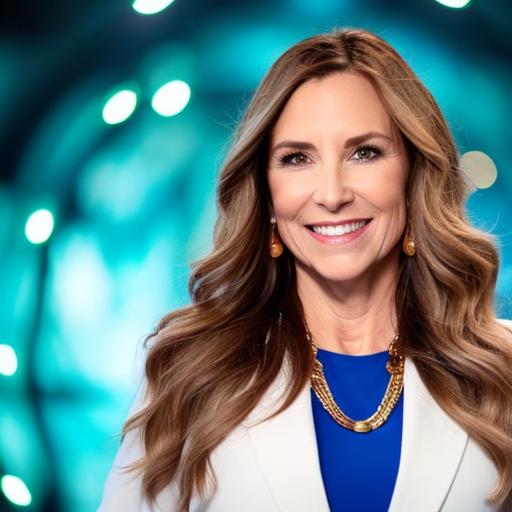 "All action is not equal." A phrase so simple, yet deeply profound. In the age of information, where the internet, books, and countless resources are at our fingertips, it's effortless to become trapped in a cycle of perpetual 'learning'. We can spend hours, days, even years, consuming knowledge, thinking that we are taking meaningful action. But is this movement or is it progress? Imagine two runners. One is running on a treadmill, clocking miles without ever moving from his starting spot. The other is on a track, each step taking him closer to a finish line. Both are exerting effort, both are 'in action'. But only one is actually getting somewhere. It's crucial to discern between motion and progress. Motion keeps you busy. It gives you the illusion of productivity. It's reading another article, watching another seminar, or attending another meeting. But progress, on the other hand, is tangible. It's the application of what you've learned, the steps you take that lead to a change, an outcome, a result. The wisdom lies not in the amount of knowledge you consume, but in your ability to sift through that vast ocean of information and pick out the actionable insights that will truly "move the needle". It's about identifying and executing the high-leverage tasks that lead to exponential outcomes. So, the next time you find yourself "taking action", pause and ask: "Is this action getting me traction? Or am I just running in place?" Because while all action is commendable, it's the direction and purpose behind it that determines the magnitude of its impact. #MotionOrProgress #DrJoleneChurch #BusinessStrategistCoach
0 Comments
 At the core of our being, humans have always been social creatures. Our ancestors thrived and survived in tight-knit communities where collective effort was the key to overcoming challenges. Being accepted within these communities wasn't just about feeling good—it was often a matter of life and death. Those who were ostracized faced the stark realities of isolation, lack of protection, and diminished resources. As a result, an innate desire to fit in and belong has been hardwired into our very DNA. With time, while the threats of old have largely dissipated, the evolutionary remnants of this fear remain. The modern world, with its intricate web of social interactions and the magnifying effect of social media, constantly triggers these deep-seated fears. We find ourselves perpetually concerned about fitting into societal molds, fearing the metaphorical 'exile' that comes from being different or not meeting perceived standards. It's this historical and evolutionary background that makes the opinions and judgments of others feel so weighty in our lives. The High Costs of People Pleasing In our contemporary era, where perceptions can seemingly make or break personal and professional relationships, many find themselves inadvertently ensnared in the trap of people pleasing. This seemingly innocuous desire to be liked and approved of carries with it a weighty toll. For starters, when we're constantly tailoring our actions and beliefs to align with what we think others expect of us, we risk eroding our true self. The very essence of our individuality can get muddled or lost amidst a cacophony of external voices, leading to a profound loss of self-identity. This external-driven life can also become a potent source of mental and emotional drain. The continuous oscillation between what we want and what we believe others want from us creates a tension that can manifest as anxiety, depression, and an overall decline in mental well-being. But the costs don't just end at emotional turmoil. By holding back our true desires or stifling our voices out of fear of criticism or rejection, we inadvertently stymie our potential. Opportunities for growth, learning, and personal advancement get left by the wayside, leaving us in a stagnant space where our talents and dreams remain unrealized. In essence, the pursuit of external validation, while seemingly a path to societal acceptance, often leads to a personal quagmire where true happiness and fulfillment remain ever elusive. The Empowering Embrace of Independence When we begin to distance ourselves from the need for external validation, a transformative shift occurs. Suddenly, life takes on a clarity that perhaps seemed previously elusive. The first and perhaps most profound change is the blossoming of authentic living. When the din of outside opinions fades, we're better able to tune into our inner voice, allowing us to align our actions and decisions with our true values, passions, and aspirations. This alignment fosters a genuine sense of contentment and fulfillment, for we are finally living a life that is uniquely our own, undiluted by external pressures. Beyond the joy of authenticity, our mental well-being often sees a marked improvement. The pressures and anxieties that once weighed heavily upon our shoulders – the ceaseless wondering if we're 'good enough' for society's standards – begin to dissipate. In this newfound freedom, there's a mental spaciousness that can lead to reduced stress, greater joy, and an overall elevation in our quality of life. Additionally, when we free ourselves from the fear of others' judgments, we inadvertently forge a resilience that becomes our shield against life's inevitable setbacks. Criticisms, instead of being debilitating, are taken in stride. We can objectively assess them, take constructive insights if they exist, and discard the rest without letting it dent our self-worth. This resilience is not just a defense but also an enabler, pushing us to take risks, chase dreams, and embrace life's adventures without the paralyzing fear of 'what will people think'. In essence, the act of letting go of others' opinions isn't just a rejection of societal pressure; it's a celebration of self, an empowering journey that liberates us from invisible chains, allowing us to experience life in its most authentic and exhilarating form. Navigating the Path to Self-Assurance Stepping away from the weight of societal judgments is a commendable goal, but it's no easy task. The journey requires intentionality, patience, and a toolbox of strategies tailored for this transformative process. The first crucial step towards this independence is cultivating self-awareness. By regularly introspecting and reflecting upon our motivations and actions, we can discern when we're making decisions based on genuine desire versus a perceived expectation from others. Why does a certain opinion matter? What fears are attached to it? These are questions that help us confront and untangle the deep-rooted concerns driving our people-pleasing tendencies. In the age of technology, the ubiquity of social media platforms can exacerbate our concerns about external judgments. Their design often thrives on validation, with likes, comments, and shares serving as modern-day metrics for social acceptance. It might be beneficial to limit or curate our exposure to such platforms, ensuring that our digital environments support our mental well-being rather than detract from it. Positive affirmations, though seemingly simplistic, can be powerful allies on this journey. By actively and consistently replacing people-pleasing thoughts with empowering statements that reaffirm our self-worth and autonomy, we begin to rewire our neural pathways, slowly shifting our mindset from external validation to internal contentment. However, it's also essential to remember that no one is an island. As we navigate this journey, seeking support from like-minded individuals or communities can be invaluable. By surrounding ourselves with people who champion authenticity, individuality, and personal growth, we not only find encouragement but also witness the liberating power of living free from societal constraints. In essence, moving away from the shackles of external opinions is not about isolation but evolution. It's a deliberate and ongoing process of growth, demanding tools, techniques, and support structures to help us reclaim our autonomy and, ultimately, our authentic selves. The Importance of Balance in Feedback While there's undeniable liberation in detaching from the weight of external opinions, it's vital to approach this journey with nuance and balance. Feedback, in its various forms, isn't inherently detrimental. In fact, constructive criticism can serve as a beacon, illuminating areas of growth and potential improvement that we might not have recognized on our own. What's crucial is discerning which feedback to take on board and which to let go. It's important to differentiate between feedback that comes from a place of genuine concern and that which is born out of malice, envy, or sheer indifference. Feedback grounded in insight and care, even if initially challenging to digest, can often lead to significant personal and professional growth. In contrast, criticism that stems from negative intentions or shallow perceptions might not offer any real value and could be detrimental if internalized. The art lies in developing a selective filter—one that can sieve through the myriad voices and opinions we encounter daily, holding onto the gems of wisdom and discarding the unnecessary chaff. This discernment ensures that while we maintain our independence and authenticity, we remain open to growth and learning. Moreover, it's essential to remember that while we may choose to limit the weight we give to others' opinions, human connection and mutual respect remain foundational elements of our social fabric. By valuing feedback while maintaining a firm sense of self, we strike a harmonious balance, ensuring that our path of self-liberation doesn't inadvertently morph into a road of isolation or insensitivity. Rediscovering Authenticity and Inspiring Others When we embark on the journey of living free from the burdensome chains of societal expectations, we don't merely alter the trajectory of our own lives; we set forth a ripple effect that has the potential to inspire countless others. By embracing our true selves, unapologetically and with pride, we become living testaments to the joy and liberation that arise from authenticity. The path to such authenticity isn't merely a rejection of societal norms; it's a profound act of self-love and self-acceptance. As we step into this space of genuine self-expression, we find that life's hues become richer, experiences deeper, and joys more profound. The energy once expended in conforming and pleasing can now be channeled into passions, pursuits, and dreams that were perhaps once stifled. Moreover, in a world where many grapple with the weight of fitting in, witnessing someone break free from this mold offers hope and validation. It sends out a message, loud and clear: "It's okay to be you." And this, in turn, encourages others to explore their own paths of self-discovery. Remember, the journey of not caring about what others think is not one of disregard or indifference but one of profound empowerment. Dr. Seuss's words, (and as you know, he is a continual source of inspiration for me), "Be who you are and say what you feel, because those who mind don't matter, and those who matter don't mind," encapsulate the essence of this journey. By embracing our authentic selves, we not only elevate our own lives but light the way for countless others to do the same. It's a beacon of hope, resilience, and freedom in a world that often seeks conformity, reminding us and everyone around us of the unparalleled power of genuine, unbridled self-expression. |
AuthorJolene holds Doctorate of Management in Organizational Leadership and is a certified master success coach. Jolene's writing is continually inspired by the challenges that her clients are facing. She finds constant inspiration in the world around her and is profoundly honored to be living her purpose helping others turn impossible into possible. Archives
March 2024
|
HoursM-F: 5am - 9pm PST
|
AddressP.O. Box 7494
Chico, CA 95927 |
Telephone951-492-9497
|
|

